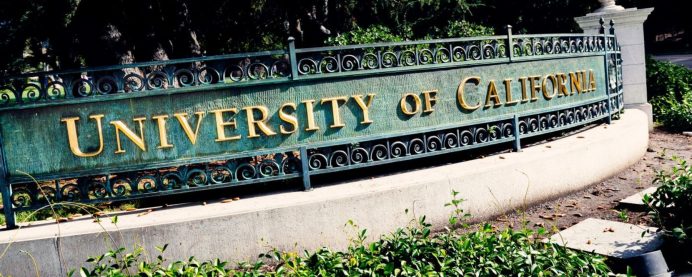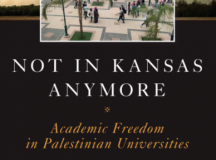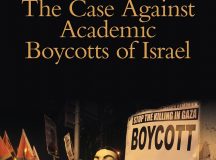The University of California and the University of Illinois at Urbana-Champaign UIUC are on the verge of green-lighting academic departments taking official stands on controversial political topics, including Israel. Cary Nelson, President of the American Association of University Professors from 2006 to 2012, argues this unprecedented change will sacrifice protections for individual academic freedom in the service of collective political action, substantially undermine the university’s status as an unbiased site for the exploration of views and the pursuit of truth, undermine public confidence in the apolitical character of the university mission, and all these effects will only increase over time.
For the last year I have argued repeatedly to all who would listen that May 2021 represented a watershed moment for the anti-Zionist politicisation of the academy.[1] That month Women’s and Gender Studies programs organised an international campaign for departmental endorsement of a statement identifying Israel as a moral and political outlaw. On my own campus four academic programs either signed that statement or issued one of their own; Gender and Women’s Studies, Asian American Studies, Urban and Regional Planning, and History.
Neither I nor colleagues elsewhere have been able to find earlier examples of academic departments taking official stands on controversial political topics. Even during the Vietnam War, during the 1970s when opposition to the war was near universal in the academy, individual departments did not do so, though some faculty senates did. But in May of last year academic programs for the first time officially represented themselves as vehicles of anti-Zionism. They did so without acknowledging that Zionism is the national movement of the Jewish people, seeking Jewish political self-determination in their ancestral homeland. They find nothing nuanced, let alone anything positive, to say about Israeli society. In contrast to occasional statements on social issues reflecting broad campus consensus, academic units were now endorsing a political position that sharply divided students, staff, and faculty. More recently, a new and more decisive phase of departmental politicisation has been in process, not only in the University of California but also on my own campus, the University of Illinois at Urbana-Champaign.
California’s system-wide academic senate is considering whether to establish departmental politicisation as a guaranteed right. The faculty senate of UIUC, the flagship campus of the University of Illinois system, may be on the verge of doing the same.[2] The Illinois senate committee that drafted the policy recommendation, the Committee on General University Policy, has urged its adoption; its recommendation is now being reviewed by the Senate Committee on Academic Freedom and Tenure.[3] Some Faculty members in both states have expressed their opposition to department political statements, so far to no avail. If the California and Illinois systems endorse departmental politicisation, other campuses are likely to follow. Given the international character of the list of departments signing the May 2021 anti-Zionist statement, among them programs in Britain and Canada, some universities in other countries may follow the US example.
Now is the time for all of us to consider the consequences. To do so, we need to focus not primarily on any short-term impact on Israeli policy, which is at most negligible, and instead on the damage such statements do to the academy itself. Going forward—and I offer this as a general recommendation—we need to make a clear analytic distinction between the impact on Israel and the impact on institutions in the West. We can no longer neglect the damage anti-Zionist campaigns are doing to the institutions of the West and their constituencies. The damage that Jeremy Corbyn’s antisemitic anti-Zionism did to the British Labour Party is a telling example.
When many of us began speaking out against academic boycotts of Israel and the BDS movement fifteen or more years ago, we concentrated on countering disinformation about Israel. The damage done to Western culture itself always seemed no more than collateral. The main story was the assault on the Jewish state. As the BDS movement repeatedly failed to light the fires necessary to achieve its scorched earth policy toward Israel, but nonetheless persisted, it gradually became clear that changing hearts and minds in the West was a primary goal, not really a secondary one, let alone a minor distraction. That was one of the points stressed in The Case Against Academic Boycotts of Israel in 2015. It suggests we need not only to counter misinformation about Israel and promote an equitable two-state solution but also to address the significant damage academic and other communities are doing to themselves.
When departments take stands on political topics contested on campus it has a powerful coercive effect on the most vulnerable members of the campus community—students, assistant professors, contingent faculty, and staff. Both undergraduate and graduate students rely on the good will of their professors, whether for letters of recommendation or fellowship support. Contingent faculty are often appointed semester-by-semester; they are at will employees who can be nonrenewed without cause. Assistant professors await tenure decisions that can end their careers. All these judgments about individual people can be motivated by political disapproval.
But self-censorship can be still more profound, shaping entire careers. Suppose a department issues a statement condemning Israeli ‘racist brutality’ and pledging ‘solidarity with Palestine’. Would a graduate student thinking of writing a dissertation on Israeli-Arab relations dare lean towards Israeli positions or even strike a careful balance? Departments that have publicly and collectively announced the ‘correct’ political line on the Middle East would not need to expel the student or cut off funding to destroy his or her career; a cold letter of evaluation would suffice. Indeed, students lacking near suicidal levels of courage would be driven off the topic they wanted to study or, worse, would dissemble and adopt the party line. Self-censorship would begin with Zionist undergraduates fearful of receiving a punitive grade, but it would reverberate throughout the department. Academic freedom would be fatally compromised—not officially, but consequentially nonetheless.
The temptation to political self-censorship thus seems obvious to many of us, but it is apparently discounted by advocates of a right to departmental politicisation. On my own campus, a number of long-time tenured faculty insist in conversation that these groups are not truly threatened because they retain both their First Amendment rights and their academic freedom. They reject concerns about coercion as structurally inaccurate, negated by the rights people retain. Declaring that people have the right to speak hardly suffices as a response to the fact that they are afraid to do so. Tenured faculty member obliviousness to the vulnerabilities of others, of course, is nothing new. It has defined higher education for more than half a century and allowed the reliance on contingent faculty to escalate.
Explaining the coercive effects of official politicisation is made still more difficult because some faculty believe all political speech, including hate speech, is protected from sanction or regulation. Some are uncomfortable when administrators condemn hate speech. We have faculty and administrators who believe swastikas are protected political speech.
The coercive impact of departmental supermajorities imposing political conformity is decisive. It does not merely chill alternative opinion; it thoroughly suppresses it. In some departments, there has for years existed, in hiring, an unofficial litmus test of opposition to Israel. That has produced departments that speak with one voice. Those who dispute the coercive effect of such supermajorities are often either self-deceived or eager to see those coercive effects imposed. Significant coercion follows from consistently politicised hiring, which produces informal political consensus. But the discussions that precede formal declarations lead to more overt consensus. Adopting political statements then establishes a public seal of conformity.
The California proposal recommends that dissident department members be given the right to express their ‘ minority viewpoints . . . on the same platform as the departmental statement.’ This is an inadequate attempt to address the problem. Designating alternative political positions as less valid minority views can actually make the problem worse, enhancing the damage done to a number of academic disciplines, to the dissenting individuals, and to the academy as a whole. Dissident students and faculty will be marginalised. Implicit notice is given to prospective students and faculty about whether they are welcome. Too often even silent acquiescence in the supermajority’s political agenda does not suffice. You have to voice your support.
The California proposal, moreover, does not confront what is the most obvious problem with its plan for minority opinion, which is that few faculty will wish to embrace the risk of social isolation inherent in objecting to majority opinion. Junior faculty and graduate students will be especially reluctant to do so, but even tenured faculty who disagree with majority department opinion will choose to remain silent rather than isolate themselves.
Those of us who believe peace cannot be achieved through demonisation of Israel routinely decry the relative paucity of younger faculty taking leadership roles in Israel advocacy. But I now routinely advise grad students and untenured faculty to keep their heads down, not to avoid controversial political commitments, but to do so quietly and behind the scenes until after tenure. Two things compromise that advice. First, relatively few people acquire courage after years of silence in grad school and still more on the tenure track. Second, it is usually unnecessary to give the same advice to anti-Zionist grad students and untenured faculty in the humanities and interpretive social sciences. They should determine how the political winds in their department are blowing, but they are not taking any risks in passionately advocating the elimination of the Jewish state if their senior colleagues feel the same way. Most of the audible young faculty voices on some campuses are opponents of Israel—often fierce ones.
Moreover, tenured Zionists who speak out may still face consequences. Many examples are enumerated in the books Anti-Zionism on Campus, edited by Andrew Pessin and Doron Ben-Atar and Poisoning the Wells, edited by Corinne Blackmer and Pessin. On my own campus, the most accomplished associate professor in my 50 years of experience has been denied promotion to full professor repeatedly, a consequence in part of public pro-Israel advocacy post-tenure. If you aren’t willing to pay a price for unpopular political advocacy, you might as well embrace a lifetime of cowardice and self-censorship. Most academics do exactly that. Forty-four Faculty members on my campus signed a letter to the administration protesting departmental political statements, but several were fearful of consequences if they made their names public, so the letter had to be released unsigned. Without much more aggressive support from the academic community, the number of young faculty who openly admit support for Israel will continue to remain small. Campus debates will be impoverished.
For decades the University of Chicago’s 1967 Kalven Committee ‘Report on the University’s Role in Political and Social Action’ has stood as the gold standard on matters of institutional political neutrality. It states that a university ‘must sustain an extraordinary environment of freedom of inquiry and maintain an independence from political fashions, passions, and pressures.’ The report has helped persuade both institutions as a whole and individual academic units from constraining individual academic freedom by adopting political positions, even when they reflect majority opinion. The university ‘is a community which cannot take collective action on the issues of the day without endangering the conditions for its existence and effectiveness.’ The same is true for any academic program devoted to free and un-coerced research and teaching.
Both the California and the Illinois proposals make gestures toward acknowledging the risk of coercive effects on vulnerable community members. Since the California document is dated 2 December 2021, and the Illinois version is dated 4 April 2022, exactly four months later, the Illinois drafters may have simply decided to echo the California concern, though the California expressions of concern are more detailed. The California statement raises the possibility that ‘ minority viewpoints within the department may be suppressed,’ that ‘the departmental statement may have a chilling effect on their speech that can infringe on academic freedom.’ The Illinois drafters apparently did not care for the California recommendation that dissenters be given space to state their views.
Both proposals are written in abstract generalities, but make no mistake: both these proposals are about what is for some the great moral priority of our time—demonising the Jewish state. Departments did not show much concern about the slaughter of civilians in the Syrian civil war, and as of spring 2022 few have issued statements in support of Ukraine. Nor have US departments so far been competing with one another to defend abortion rights, though action by the US Supreme Court may change that, making abortion rights the first issue unrelated to Israel that inspires departments to issue formal statements.
But campus authorisation of department political statements will encourage interventions on other subjects as well. The possibility of duelling statements in opposition to each other on the same or different campuses is a real possibility. Some public universities could find themselves in consequential battles with state governments that hold opposing views on controversial topics.
The Illinois policy statement observes that ‘a department (college, school, or other unit) is by definition an institutional entity’ but, like California, adopts the misguided conclusion that, so long as a department includes ‘an explicit disclaimer that its statement or position does not represent the university as a whole,’ departmental politics will not be misconstrued. My law school colleague Richard Ross wrote an advisory letter to the Senate’s Academic Freedom Committee that exposes the misleading assumptions behind disclaimers succinctly:
Disclaimers do not convince instructors and students that a department’s political commitment expressed on its website is anything other than a political commitment to be crossed at one’s peril. Second, it makes no sense for a department to say that it is ‘ not speaking for the institution.’ Faculty commit a department to their favored opinions precisely in order to put an institution behind their personal politics. Making the department as an institution speak is the whole point of the exercise.
The Illinois policy drafters also apparently assume that a disclaimer will suffice to discount the possibility that, ‘when several units post similar statements,’ they ‘may be taken as representative of the wider institution.’ Both California and Illinois draft guidelines notably ignore the most likely impact of several related units making comparable political commitments. Indeed, US campuses already face linked disciplines announcing political solidarity and conformity. The public can rationally conclude that humanities departments are trending both toward anti-Zionism and overall politicisation, whereas STEM fields are not.
The Illinois guidelines offer procedures for ‘a host of campus or public issues which some might consider “political,”’ but that gesture obscures the core of the problem, which is that statements about political issues—while they may have ethical, moral, religious, historical aspects—remain incontrovertibly political. Following this cursory attempt to acknowledge the knotty problems of politicisation, the text of the Illinois guidelines makes clear that it actually supports the right of ‘departments or other units to’ issue such statements without reservation. It asks the senate to endorse that right by adopting the guidelines.
In a further effort to confuse matters, the Illinois statement conflates public attacks on scientific consensus—attacks that misrepresent such consensus as political—with its own efforts to promote wholly unscientific departmental political opinion on issues where legitimate differences proliferate. There is certainly a need to reinforce the right of academic units to stand behind ‘evolution and climate change as established scientific truths,’ as the statement argues, but the claim that Israel is the world’s worst violator of human rights is not an established scientific truth. Indeed, it is not any kind of truth. The use of chemical weapons in Syria did not persuade Israel’s devoted opponents that human rights violations there should take priority—or even that they were consequential. Could developments anywhere displace convictions about Israeli criminality?
In what perhaps represents a delusional faith in faculty self-restraint, the Illinois statement offers some guiding reservations about departmental political statements. It warns that ‘some prospective students’ who hold opposing views ‘might feel that the university would not be a welcoming place for them.’ If several departments issue similar statements, that consequence is guaranteed, not hypothetical. Of course advocates of the ‘Zionists are not welcome here’ principle hope for exactly that result. And anyone who thinks pro-Israel students will not avoid officially anti-Zionist departments must have little regard for student common sense. With Jewish Voice for Peace members on hand to condemn Israel, departments can show they have no wish to be Judenrein. Only good Jews need apply.
In the light of such concerns, the Illinois guidelines solemnly advise that ‘a statement by a unit as such has serious potential consequences that need to be taken into consideration in how it is formulated and expressed.’ Where fierce anti-Zionism is at stake, departments might pause to determine the best rhetoric to use in condemning Israel, perhaps adding reassurance about how thoughtful they have been, even adding that they have arrived at their conclusions with great difficulty, but they are not going to remain silent about what they believe is the battle between good and evil. As Richard Ross wrote to me, ‘even if the Senate imposes reasonable guardrails and counsels against departmental statements, departments that are coming to see activism as a responsibility, even a glory, will simply ignore the guardrails or issue meaningless disclaimers.’
The Illinois guidelines’ last irrelevant principle follows. No one will look good if departments issue political statements gratuitously, if the issues at stake ‘have no overt relationship with their academic missions.’ That leads to explicit advice: ‘It is strongly recommended that such a statement clarify how the position is directly related to the unit’s academic scope and mission.’ If anyone thinks this will limit anti-Zionist politics to departments called ‘ Middle East’ or ‘Israel’ studies, they are self-deceived. A wide range of departments teach Jewish or Israeli subject matter. Many more programs have research or study abroad relationships with Israeli institutions. Still others have investments in the theoretical and political issues under debate, from social justice to nationalism to imperialism to colonialism to religion to ethnicity to racism. Some disciplines already stifle debate on these topics. Others are invested in broadly relevant subject matter, from international relations to business standards to theology. The bottom line is this: any department on campus can make a case for why it needs to issue an anti-Zionist statement.
I have no doubt that there were some on the Illinois authoring committee, the Committee on General University Policy, who knew that the cautions and reservations were merely window dressing. Indeed, the guidelines really aim to offer anti-Zionists cover for the political commitments that will corrupt the university mission. As another colleague suggested, ‘the admonition “strongly recommended” is likely to end up meaning nothing, as it can be overridden by the same majority and on the same issue.’
There are at least two other ways that corrosive effect is enhanced. Some academic disciplinary associations, among them the American Studies Association and the National Women’s Studies Association, had already condemned Israel and endorsed academic boycotts. They thus gave their grad students and faculty tremendous professional cover for anti-Zionist advocacy in scholarship and teaching. When the local department adds its condemnation, as happened with Women’s and Gender Studies last May, the support for anti-Zionist convictions and the pressure to conform to anti-Zionist practices intensifies. Why tolerate Zionist views in the classroom if your department has declared them to be false and immoral?
Of course many faculty members do not maintain membership in their national organisation. Unlike departmental membership, it is not universal. Nonetheless, the force of a national disciplinary resolution is substantially increased by formal local adoption of comparable political views. The local department for many is the vehicle of their professional and disciplinary identity. College and university support and reward systems—travel funding, graduate student teaching, sabbatical approval, and promotion and tenure—originate at the department level. The cost of being perceived as a political outlaw by the department head or members of major committees is a considerable one that many are unwilling to take on.
Yet another important development has occurred with the California and Illinois proposals—the justification of departmental politicisation as an expression of academic freedom. Those who object to departmental politicisation can thus also be seen falsely as abridging academic freedom. The California text supports the claim that ‘restricting the ability of departments from making or endorsing such statements . . . would itself violate the academic freedom and/or free speech of faculty members in these departments,’ though it offers no reasons to conclude that the fundamental individual right to express political views extends to academic units as a whole. Individual faculty, for example, can endorse political candidates, but departments have been unable to do so. State laws in the US often explicitly prohibit public university electioneering that uses resources like university email or stationery. Departments do not possess academic freedom in the same way that students and faculty do, rights that have been established as international standards. Departments’ limited rights and specific responsibilities are negotiated with campus or system administrators. The Illinois chancellor in an October 2021 letter expressed a more absurd concern that restraints on departmental political speech could chill campus political speech more broadly.
This conceptual sleight of hand obscures a difference that the Kalven report insists must be maintained to protect the survival of the university as we know it. Part of the damage the Illinois guidelines would do is reflected in their disingenuous quotation of the AAUP principle that political statements ‘should show respect for the opinions of others.’ But the anti-Zionist political statements we have seen make that impossible. They contrast what is true and just with what they consider unjust and reprehensible. They thus inevitably override the views of those who disagree. They amount to dogmatic declarations that silence debate. The Illinois Committee advises that departments should ‘consider carefully whether or not the statement truly does represent the full membership of the unit,’ but all that caution does is make matters worse by promoting the tyranny of large majorities in political matters.
Both proposals sacrifice protections for individual academic freedom in the service of collective political action. The proposals substantially undermine the university’s status as an unbiased site for the exploration of views and the pursuit of truth. They will undermine public confidence in the apolitical character of the university mission. Those effects will increase over time.
Faculty have always been tempted both to inflate the status of their academic freedom and to embrace its rights but not its responsibilities. The California and Illinois proposals set aside the collective responsibility toward vulnerable community members, the public, and the university’s larger mission. They represent an indulgence in faculty hubris and overreach. Primarily vehicles for virtue-signalling, they combine expressions of hostility toward Israel’s campus advocates with ill-considered bravado aimed at the public.
One must ask, finally, what if any admirable political purpose these departmental declarations serve? They are not going to change Israeli policy. They cannot affect US or British government policy without years of increasing impact. They can intimidate vulnerable colleagues here or abroad, but of course no one wants to embrace that one verifiable consequence openly. It is time to ask what social and political price universities will pay for permitting departmental indulgence in expressions of uncalled-for political solidarity.
References
[1] My thanks to David Greenberg, Richard Ross, Paula Treichler, and others for their comments on earlier drafts.
[2] One member of the Illinois committee did consult with me, though he did not share either a draft of nor any details about the proposal. The Committee also includes the most persistent faculty opponent of Zionism who is active in campus affairs.
[3] Whether the Urbana-Champaign campus can implement the policy on its own is uncertain, though Illinois’s Chicago campus, in my view, would likely adopt it as well.






































This is a very good article, which clearly recognizes that the BDS movement is focused primarily on shaping the climate on campuses and only secondarily with influencing policy toward Israel.
Yet if we stop there, I suspect we’ll still be leaving out something crucial. For while demonizing Israel—and, by extension, Jews—on campuses is a major part of how BDS operates, the demonization campaign serves another function as well.
By normalizing bigotry, mendacity, and coercion in “intellectual spaces,” the campaign is a potent vehicle for changing the character of those spaces more broadly, replacing their traditional liberal norms with authoritarian tribal norms.
Seen in this way, the damage to the integrity of academic departments (as reflected in their official adoption of intellectually dishonest political positions) isn’t a merely byproduct of the anti-Israel campaign. It is, rather, central to the strategy for establishing the post-truth university, and any effective attempt to counter this strategy must recognize this larger ambition.
Put still one more way: just as promoting a willfully distorted view of Israel is a pretext for ugly behavior toward campus Jews, so that ugly behavior toward Jews is a pretext for normalizing willful distortion and ugly behavior, which facilitates the ideological capture of universities.